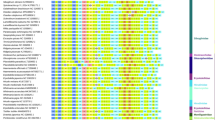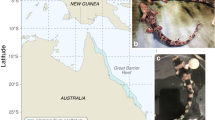Abstract
THE rate of mitochondrial DNA (mtDNA) evolution has been carefully calibrated only in primates1. Similarity between the primate calibration and rates estimated for other vertebrates2–4 has led to widespread assumption of a constant molecular clock in vertebrates even though this has never been rigorously tested5. We report here the examination of mtDNA sequence variation for 13 species of sharks from two orders that are well represented in the fossil record to test the constancy hypothesis. Nucleotide substitution rates in the cytochrome b and cytochrome oxidase I genes in sharks are seven- to eightfold slower than in primates or ungulates. This difference in substitution rate cannot be explained by nucleotide composition bias, codon-usage bias, selection, or choice of genes sequenced, and was confirmed by comparing species recently separated by the rise of the Isthmus of Panama. Such differences in mtDNA substitution rates among taxa indicate that it is inappropriate to use a calibration for one group to estimate divergence times or demographic parameters for another group. High-resolution studies of molecular evolutionary rates require taxon-specific calibrations.
This is a preview of subscription content, access via your institution
Access options
Subscribe to this journal
Receive 51 print issues and online access
$199.00 per year
only $3.90 per issue
Buy this article
- Purchase on Springer Link
- Instant access to full article PDF
Prices may be subject to local taxes which are calculated during checkout
Similar content being viewed by others
References
Brown, W. M., Prager, E. M., Wang, A. & Wilson, A. C. J. molec. Evol. 18, 225–239 (1982).
Wilson, A. C. et al. Biol. J. Linn. Soc. Lond. 26, 375–400 (1985).
Shields, G. & Wilson, A. C. J. molec. Evol. 24, 212–217 (1987).
Irwin, D. L., Kocher, T. D. & Wilson, A. C. J. molec. Evol. 32, 128–144 (1991).
Hillis, D. M. & Moritz, C. in Molecular Systematics (eds Hillis, D. M. & Morltz, C. in Molecular Systematics (eds Hillis, D. M. & Moritz, C.) 502–515 (Sinauer, Sunderland, Massachusetts, 1990).
Higuchi, R., Bowman, B., Freiberger, M., Ryder, O. A. & Wilson, A. C. Nature 312, 282–284 (1984).
Vigilante, L., Stoneking, M., Herpending H., Hawkes, K. & Wilson, A. C. Science 253, 1503–1507 (1991).
Keigwin, L. D. Jr Science 6, 350–353 (1982).
Wu, W. & Li, W.-H. Proc. natn. Acad. Sci. U.S.A. 82, 1741–1745 (1985).
Maisey, J. G. Zool. J. Linn. Soc. 82, 33–54 (1984).
Bailey, W. J. et al. Molec. biol. Evol. 8, 155–184 (1991).
DeSalle, R., Freedman, T., Prager, E. M. & Wilson, A. C. J. molec. Evol. 26, 157–164 (1987).
Kessing, B. D. thesis, Univ. Hawaii (1991).
Li, W.-H., Tanimura, M. & Sharp, P. M. J. molec. Evol. 25, 330–342 (1987).
Britten, R. J. Science 231, 1393–1398 (1986).
Schlotterer, C., Amos, B. & Tautz, D. Nature 354, 63–65 (1991).
Pratt, H. L. Jr & Casey, J. G. Natn. oceanog. atmos. Admin. Tech. Rep. NMFS 90, 97–109 (1990).
Adelman, R., Saul, R. L. & Ames, B. N. Proc. natn. Acad. Sci. U.S.A. 85, 2706–2708 (1988).
Joenje, H. Mutat. Res. 219, 193–208 (1989).
Parsons, G. R. Mar. Biol. 104, 363–367 (1990).
Thomas W. K. & Beckenbach, A. T. J. molec. Evol. 29, 233–245 (1989).
Avise, J. C. et al. Molec. biol. Evol. (in the press).
Compagno, L. J. Sharks of the Order Carcharhiniformes (Princeton Univ. Press, Princeton, 1989).
Compagno, L. J. V. Natn. oceanogr. atmos. Admin. Tech. Rep. NMFS 90, 357–380 (1990).
Naylor, G. J. P. thesis. Univ. Maryland (1989).
Espinoza-Arrubarrena, L. thesis, California State Univ. (1987).
Cappetta, H. Chondrichthes II. Mesozoic and Cenozoic Elasmobranchii Vol. 3B Handbook Paleoichthyology (Fischer, Stuttgart, 1987).
Kent, B. W. Fossil Sharks of Maryland (Department of Zoology, Univ. Maryland, 1987).
Ward, D. Tert. Res. 2, 23–28 (1978).
Felsenstein, J. Phylogenetic Analysis Package (PHYLIP) (Univ. Washington, 1989).
Palumbi, S. R. et al. The Simple Fool's Guide to PCR (Department of Zoology, University of Hawaii, Honolulu, 1991).
Author information
Authors and Affiliations
Rights and permissions
About this article
Cite this article
Martin, A., Naylor, G. & Palumbi, S. Rates of mitochondrial DNA evolution in sharks are slow compared with mammals. Nature 357, 153–155 (1992). https://doi.org/10.1038/357153a0
Received:
Accepted:
Issue Date:
DOI: https://doi.org/10.1038/357153a0
This article is cited by
-
Characterization and Phylogenetic Analysis of the Complete Mitochondrial Genome of white-spotted Bamboo Shark (Chiloscyllium plagiosum)
Thalassas: An International Journal of Marine Sciences (2024)
-
Genomic evidence indicates small island-resident populations and sex-biased behaviors of Hawaiian reef Manta Rays
BMC Ecology and Evolution (2023)
-
Low mutation rate in epaulette sharks is consistent with a slow rate of evolution in sharks
Nature Communications (2023)
-
The evolution of sexual dimorphism in Chondrichthyes: drivers, uncertainties, and future directions
Environmental Biology of Fishes (2023)
-
Characterization of the complete mitochondrial genome of the brazilian cownose ray Rhinoptera brasiliensis (Myliobatiformes, Rhinopteridae) in the western Atlantic and its phylogenetic implications
Molecular Biology Reports (2023)
Comments
By submitting a comment you agree to abide by our Terms and Community Guidelines. If you find something abusive or that does not comply with our terms or guidelines please flag it as inappropriate.



